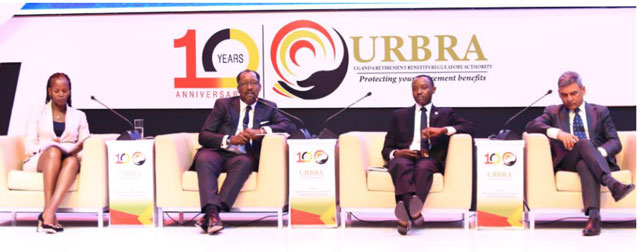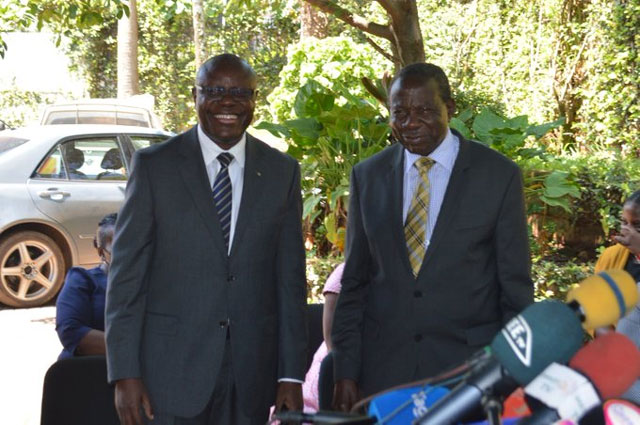
URBRA’s Nsubuga says “we think that this lump sum payment is not attractive”
Kampala, Uganda | THE INDEPENDENT | The pensions sector regulator URBRA insists that the decision to allow savers to withdraw up to 20 percent of their savings to cater for emergency financial distress was wrong and could have been avoided.
In March this year, the retirement benefits agencies in the country started implementing the new policy following a protracted debate between savers on one hand and the saving schemes and government on the other.
The policy change mainly affected the National Social Security Fund (NSSF) which had virtually the only qualifying savers as per the new policy, that allowed only persons who had saved for a total of 10 cumulative years and were above 40 years of age.
This necessitated the NSSF Amendment Act which would allow for the biggest fund in the region to pay out money under new qualifications. By the end of September 2022, about 440 billion shillings has been paid out since March, out of the earlier forecast 800 billion, if all those qualifying were going to successfully apply.
Benjamin Mukiibi, the Director Research and Strategy at the Uganda Retirement Benefits Regulatory Authority (URBRA) said most people who actually went for the money were those not in most need.
“When you look at the profile of those who accessed this money, they are the people who maintained jobs during COVID. Most of them did not need the money urgently, but needed to top on something like a vehicle,” Mukiibi said.
One of the reasons that the government, URBRA and NSSF gave was that if all people come for their benefits, the sector would slowdown to near collapse, and even greatly affect the returns at the end of the year since money was going to be withdrawn from the investments.
In September, when the NSSF year ended, 35 percent of the retirement benefits were mid-term access funds, unlike previously when almost all the payouts were lump sum.

However, Martin Nsubuga, the Chief Executive of URBRA said that they have noted that some people have realized that it was not prudent after all to rush for the money. Others are reported to have taken back the money after realising that they could after all continue managing without it.
Nsubuga said that some members actually wanted to prove that their savings existed at the Fund, not that they needed the money.
“Some have even taken it back. The message is getting deeper, people are appreciating the principle. Given the COVID era and demand some mode of financing, people have learnt they need another box for emergency. There was that fear that people’s money is not safe. People were able to access their money to confirm that their money is safe. We know the money is there, well invested, but some had their dounts,” he said.
He said many got 5% instead of the 20% to see if the new access initiative works.
Speaking at a media dialogue on the pensions sector, Joan Mugenzi, a Transformational Master Coach and Founder of Imagine Me Africa, said many people usually recklessly spend money they receive unplanned and the same happened with the Mid-Term Access funds.
She advised that retirees should as much as possible try to have an emergency fund especially in retirement, to avoid going for their retirement benefits to cater for needs they had not expected.
Since the law was formed allowing midterm access, there is fear that in case of another emergency, the government could again direct the savings schemes to allow savers access their benefits again.
It also means that whoever clocks 45 and a total of ten years of saving, is free to apply for the benefits, and therefore, the move was not for the COVID-19 pandemic related financial stress.
As a way of mitigating the effect of this and avoid the shocks on NSSF and other retirement benefits schemes, Nsubuga, the URBRA CEO, said that they are looking at using the NSSF law to give retirees their money in their bits, to cater for the risk of spending all the savings soon after receiving them.
“We think that this lump sum payment is not attractive. You do not need a prophet to tell you that after two years you will have wasted it. We are working on a policy initiative to preserve your funds, like products. We are speaking with the NSSF on other ways of preserving people’s savings and not getting it a lumpsum,” Nsubuga said.
Daisy Nabakooza, Chief Manager, Supervision and Market Conduct, said the regulator is allowing and encouraging innovation into products that will allow even NSSF savers have other products that can have diversified streams of cash.
She says that the retirement benefits housing mortgage scheme is one of the means aimed at ensuring meaningful and secure mid-term access to benefits.
****
URN
 The Independent Uganda: You get the Truth we Pay the Price
The Independent Uganda: You get the Truth we Pay the Price


